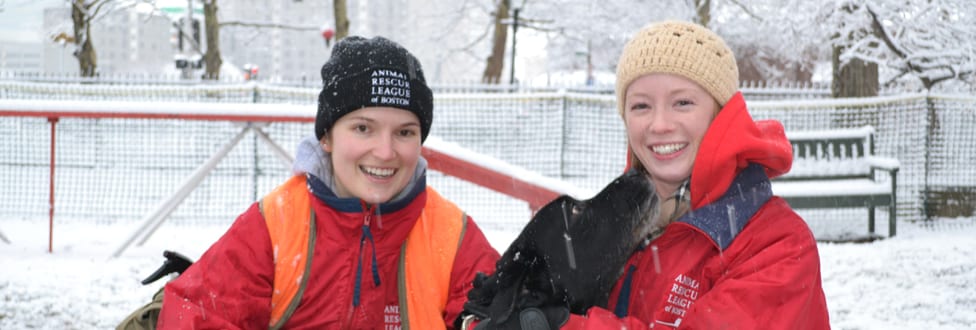Your Winter Pet Health Questions, Answered
Dr. Schettino’s Answers to Pet Health Questions from ARL’s Twitter Chat
 Thank you to all who participated in and submitted questions to ARL’s Twitter chat with the ARL’s President & CEO, Edward Schettino, DVM, PhD, CAWA.
Thank you to all who participated in and submitted questions to ARL’s Twitter chat with the ARL’s President & CEO, Edward Schettino, DVM, PhD, CAWA.
Introduction: @ARLBostonRescue: Hi everyone. Our Winter #PetHealth Twitter chat starts NOW! #ARLAskaVet
Q:@pawspluspals: @ARLBostonRescue #ARLAskaVet Should dogs always wear doggie boots/booties when they go walking on snow/ice?
A: Dr.Schettino: Doggie boots help protect your companion’s pads from salt and ice so depending on location they can be helpful. #ARLAskaVet
A: however, some dogs may not like them #ARLAskaVet
Q: @ubergirl4: My cats shed a lot during the winter and get indigestion from hairballs. What should I give them to help?” #ARLAskaVet
A: You should give them love and affection by grooming them on a regular basis. This will help reduce shedding! #ARLAskaVet
Q: @Dobrska: How do I remove sap from my pet’s fur? #ARLAskaVet
A: The best way to remove sap is to use some type of cooking oil (Olive oil ..) and gently rub into the sap. #ARLAskaVet
A: Once the sap is lose you then can use a liquid dishwashing detergent to wash out the oil. Problem solved!! #ARLAskaVet
A: And depending on the temperature outside and your location … ticks can still be a nuisance during the winter months. #ARLAskaVet
A: If it is too cold for you … your cat is probably cold as well! Be very careful and monitor your cat carefully. #ARLAskaVet
Q: What is the longest a pet should be outside when the temperature is below 32F? #ARLAskaVet
A: on your pet and when they show signs of cold: holding up their paws, shivering and becoming less active #ARLAskaVet
Q: @BostonDailyNews: Can animals get frostbite? #ARLAskaVet #Boston cc:@ARLDrS
A: Yes! Usually on their paw pads, the tip of the tail and the margins of the ears. #ARLAskaVet #Boston
Q: Cats seem to eat plants frequently during the winter. Why and is this a cause for concern? #ARLAskaVet #Boston cc:@ARLDrS
A: You are either home more often or you have moved your plants inside for the winter months. #ARLAskaVet #Boston
A: It is vital that you are familiar with what type of houseplants you have and their degree of toxicity! #ARLAskaVet #Boston
A: It all depends on the lifestyle of your dog. You should have this conversation with your local veterinarian.
Q: @CamillaRFox: @ARLBostonRescue @ARLDrS #ARLAskaVet Any winter exercise tips for large dog whose arthritis lets him swim, but little else?
A: You can find a canine physical therapist who generally have underwater treadmills that you can use.
Q: @norwoodsworld:@ARLBostonRescue @ARLDrS what’s the difference between kennel cough and canine flu? #ARLAskaVet
A: Great tweet! They both have similar symptoms but are very different – canine flu generally contd #ARLAskaVet
A: … is more severe. You should speak with your regular veterinarian regarding risks of each. #ARLAskaVet
A: Generally dogs lose heat through their paws, ears and respiratory tract.



